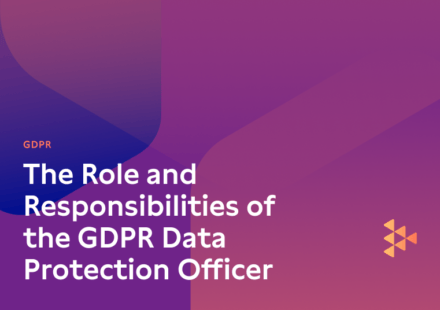Understanding everything there is to know about the GDPR can be quite the challenge, but you can start by designating a data protection officer, who is responsible internally for data protection.
Certain practices, like defining roles and responsibilities, can help to avoid common compliance mistakes. One step organizations should take for GDPR compliance is to appoint a Data Protection Officer. Here we will look at the role and responsibilities of the Data Protection Officer and how they can help you on the road towards GDPR compliance.
Common GDPR Terms and Definitions
What is a Data Protection Officer? A DPO guides and monitors compliance and all activities related to this data protection legislation. Being the DPO may be just a part of a person’s job description, in addition to their other responsibilities or their formal job title.
Their duties as DPO include monitoring compliance audits, staff training, and awareness initiatives. They ensure the protection of personal data and the data subject’s rights and are appointed based primarily on their professional qualities and expert knowledge of data protection. DPOs work closely with regulators to ensure that controllers and processors measure up to regulation requirements.
When carrying out their tasks, the DPO must focus on matters of risk, such as the processing of highly sensitive personal information or processing activities that might pose a risk to the rights and freedoms of data subjects. When performing their duties, they must do so without interference or direction from processors or controllers.
Under GDPR, what is a “Controller?” The controller is the business responsible for determining why personal data is processed and how it should be processed. They are responsible for the compliance of the processors they hire to process data for them. They are also responsible for following the strictest level of compliance with the GDPR, demonstrating full compliance with all data protection principles.
Who is a “Processor?” Processors are companies that act on behalf of the controller to process personal data in accordance with the data controller’s instructions. They make no determinations about the data processed or any results in processing. They are responsible primarily for the rights of the individual, who is also referred to as the data subject. Processors protect data during the processing phase using appropriate technical safeguards. The processor’s compliance is not held to the same level of strictness as the data controller.
What is a Data Subject under GDPR? A data subject is any person within the EU or member states who has their personal data collected, stored, and processed by a processor under the direction of a controller. This includes customers or prospective customers who submit their data to you as part of a transaction or to create an account.
6 Responsibilities of the GDPR Data Protection Officer
- Compliance: First and foremost, the DPO must inform you and your employees of your obligations to comply with the GDPR and other data protection laws. As noted above, they monitor your compliance leveraging your data protection policies and procedures to ensure you are employing the proper technical and organizational safeguards to protect personal data and adhere to the regulation rules. In addition to monitoring audits on compliance, a DPO will also conduct their own internal audits.
- Autonomy: The DPO must autonomously advise on compliance and regulatory requirements of the GDPR, without influence from the controller or processor. This is because their ethical and practical considerations must come first regarding the processing of personal data. The Data Protection Officer should remain unbiased in the pursuit and performance of their professional duties. The GDPR is also clear, a DPO can never be penalized for completing the tasks of their job.
- Report to the Highest Level: A DPO is available to all levels of the organization and reports directly to the board of directors or senior executive management to advise on data protection. The DPO ensures that management is directly invested in GDPR compliance issues and they can escalate concerns regarding data security and privacy.
- Education: In addition to ensuring that controllers and data subjects can interpret the regulation adequately, the DPO is responsible for promoting awareness and educating controllers and processors on their data protection rights. They are also responsible for ensuring that controllers and processors have awareness and training initiatives in place for their staff.
- DPIA: Although the DPO doesn’t perform a data protection impact assessment (DPIA), they guide the controller on conducting them and are required to monitor the assessment process.
- Data Protection: The DPO’s primary responsibility is to ensure that their organization processes personal data in compliance with the applicable rules and guidelines of the General Data Protection Regulation. Further, the DPO acts as the point of contact to interpret and understand those rules and guidelines for both controllers and data subjects. With that, the DPO can advise when necessary the proper procedures for following the regulation and inform controllers and data subjects of their data protection rights.
Your DPO must also be available to answer any questions that customers or other data subjects may have concerning the regulation or the protection of their personal data. During the execution of their duties and to complete their obligations, the DPO must have all the appropriate resources available to them, including time, financials, and access to personal data and processing activities.
In short, a DPO is involved in all issues relating to the protection of personal data. Their role within an organization helps the organization demonstrate accountability towards compliance.
Getting GDPR Compliant with Carbide
The Carbide platform helps your business achieve compliance with the GDPR and other industry standards by providing custom auto-generated policies, controls, and action items with a team of security experts to help you maintain a robust information security program. Talk with us to learn how we can help you get GDPR compliant.

